The job market right now is .... unusual
"The Market’s Odd right now!"
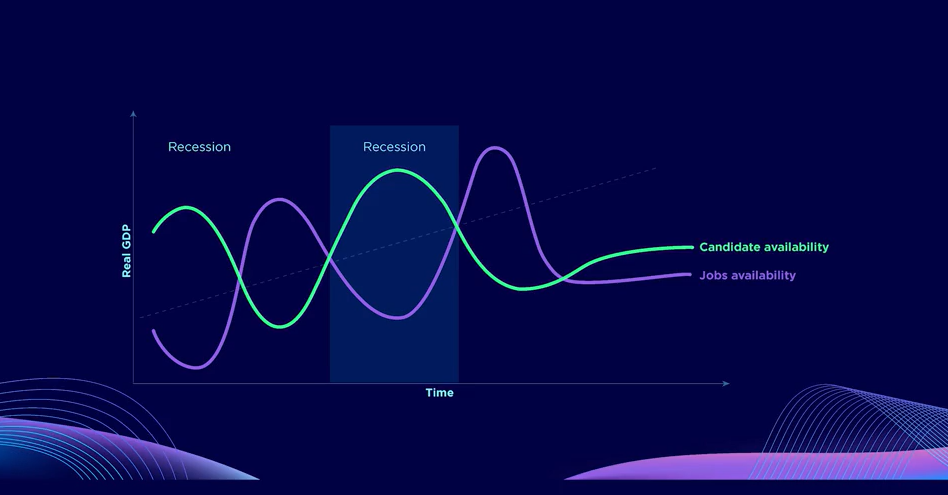
According to data in a recent keynote presentation from Jeff Neumann (SVP of Product Marketing at Bullhorn), we’re in a strange market at the moment - in limbo between boom and bust in a place where the usual rules don’t seem to apply.
Things feel a bit off at the moment...There are jobs, but not as many as there were. There are candidates, but fewer willing to move. And there’s plenty of advertising, but not a lot of real movement happening.
We’re in a phase that doesn’t follow the typical cycle.
Normally, when job vacancies rise, candidate availability falls or the other way around. But at the moment, both are somewhat down.
Employers are hiring, but they’re a bit hesitant. Candidates are open and changing jobs, but only just. And job ads are out there, but a fair chunk of them are actually "ghost listings" or long-shots, not real live roles with start dates and interview plans.
It’s a strange middle ground we’re in. Confidence on both sides is low, and decisions are taking longer.
But it’s not all bad news. The data says we’ve hit the bottom of the dip and now we’re hovering.
That means there’s opportunity. Not the boom-and-bust kind, but the sort of slow, steady activity that favours those who are deliberate, honest, and consistent in how they engage with the market.
Job Ads Are Up… But They’re Not All Real
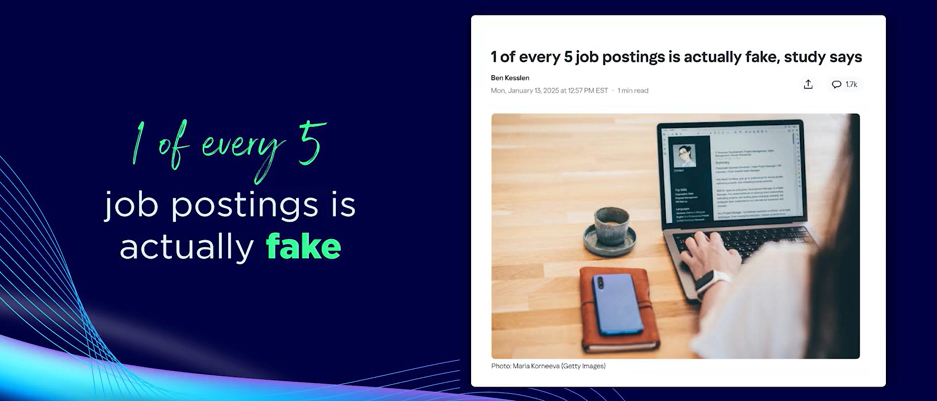
According to the Bullhorn GRID 2024 Talent Trends report, there's been a slight lift in advertised roles...but candidate applications are trending down.
And here's the worrying bit:
- A Harvard study found 40% of corporate hiring managers admitted their company had posted "ghost jobs" in the past year.
- Another report published recently in the Wall Street Journal showed 1 in 5 corporate job ads were completely fake.
And the reason? They found that if they were advertising more jobs, it increased internal moral, boosted productivity and revenue!
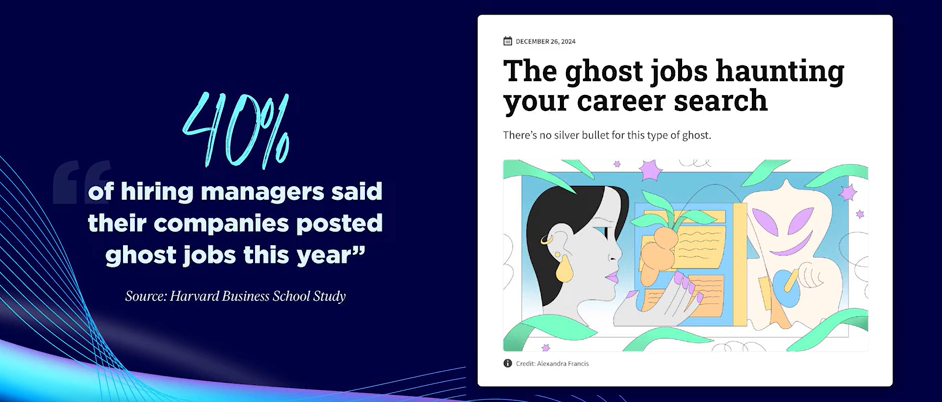
So-called "ghost jobs" are unfortunately, surprisingly common now both with recruitment companies and in house organisations - roles that have already been filled, ads posted to gauge interest, or listings kept live just in case.
Whatever the reason, it adds noise and can make it harder for genuine opportunities to stand out.
Candidates Are Frustrated – and Dropping Out

Overall, the candidate experience is also not amazing right now.
- It now takes an average of 4 months to land a new job – a 20% increase from last year.
- 2 in 5 candidates are now declining job offers, up from 1 in 5 just a year ago.
And it’s not because they’re fussy. It’s because too many are applying for fake jobs, being ghosted, strung along, or left in the dark. They’re losing faith in the whole process.
The Bullhorn report also shows that candidate ultimate acceptance or declining of the job offer is heavily tied to how they're treated during the process – things like application feedback, interview follow-up, and response time all play a huge part. When that’s missing, people switch off.
Job Vacancies Have Dropped – But Expectations Haven’t
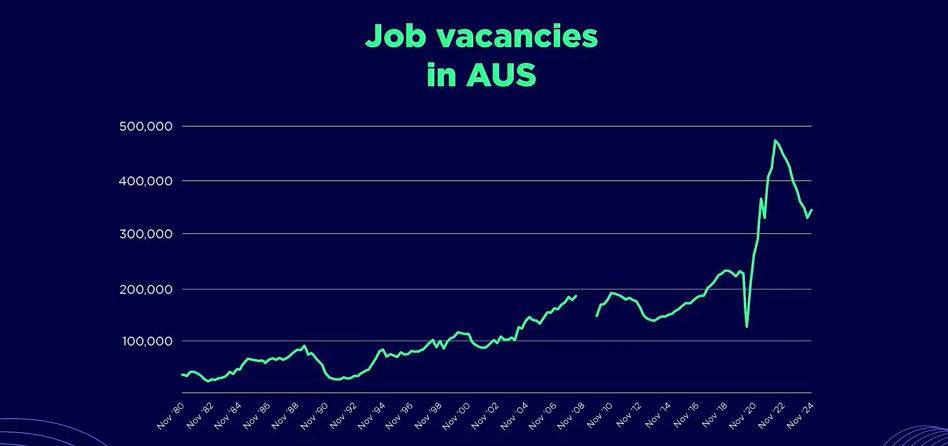
The long-term job vacancy trend in Australia shows that vacancies peaked in late 2022 at over 480,000, but they’ve since dropped by more than 100,000 roles.
Yet somehow, expectations haven’t adjusted.
Companies still want shortlists in a week. Candidates still expect interviews to move quickly. But that speed and confidence from both sides just isn’t there.
The volume has dropped, but the pressure hasn’t... and that disconnect is making the whole process harder.
We’re Not in the “Great Resignation” – It’s the “Great Stay”
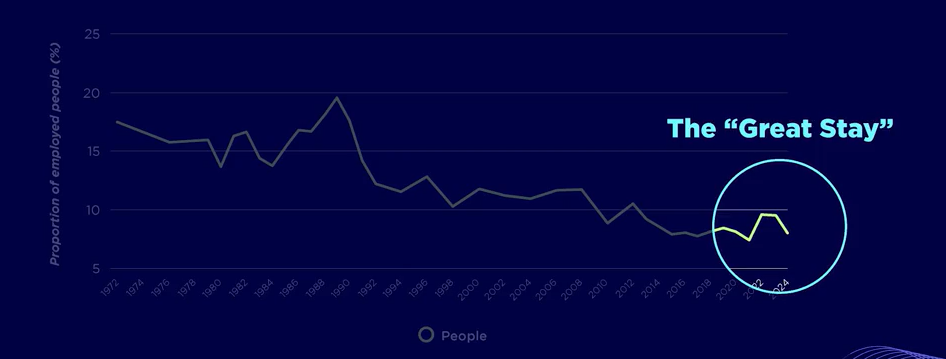
Everyone’s still talking about mass resignations and career pivots. But the data paints a different picture.
The proportion of employed people in Australia changing jobs has hit a historic low.
We’re calling it the “Great Stay”. It’s not that people are thrilled where they are - they’re just not convinced there’s anything better on offer. Unless there’s a compelling reason to move, they’re sticking with what they’ve got.
That means fewer active candidates. More passive ones. And a bigger burden on recruiters and employers to make a case worth listening to.
Job Boards Still Dominate – But Trust Is Slipping
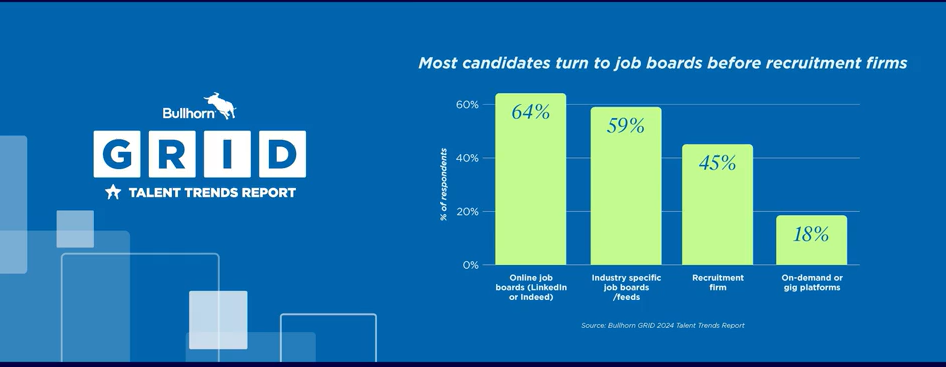
Bullhorn’s data shows 64% of candidates still go to online job boards first, followed by industry-specific boards (59%) and recruitment firms (45%).
But trust is fading across all advertised jobs. When fake ad listings become the norm, people stop believing what they see.
Candidates lose interest and advertised roles get ignored.
Time to Reset
Here’s what employers and recruiters can do right now:
- Only advertise real jobs. Don’t test the market unless you’re serious.
- Communicate clearly, and fast. Even if it’s a no, say something.
- Shorten your process. If it takes four weeks to organise a first interview, you’ve already lost them.
- Treat people with respect. Ghosting should have no place in recruitment.
- Use tech to support the process, not replace it. Automate admin, but keep the human touch.
This market will shift but we need to stop chasing volume and get better at quality.
Fewer ads, better engagement, proper follow-up, more human touch.
There are good candidates out there. There are good jobs too. But they’re not finding each other like they used to.
If we want better outcomes, we’ve got to fix the middle bit and Bring people together properly!
Note: You can watch the full keynote presentation here – its an hour long, but the first 12 minutes cover the topics discussed above with the rest outlining Bullhorns new products and features including their AI Capabilities




